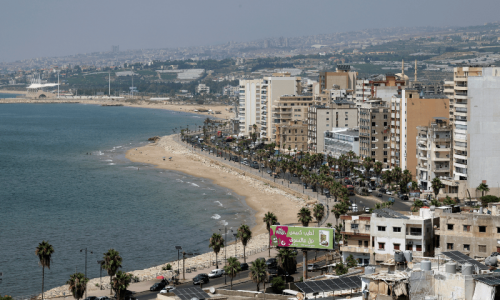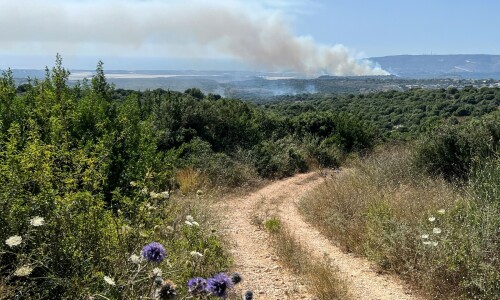WASHINGTON: The United States warned Israel on Tuesday that a conflict with Hezbollah could spark a regional war, as UN agencies said 10 children a day are losing one or both legs and half a million Palestinians suffer “catastrophic” hunger in Gaza.
US Defence Secretary Lloyd Austin met his Israeli counterpart Yoav Gallant at the Pentagon, saying diplomacy is the best option as fears of a major war against Iran-backed Hezbollah in Lebanon have grown after months of cross-border fire.
“Another war between Israel and Hezbollah could easily become a regional war, with terrible consequences for the Middle East,” Austin said. “Diplomacy is by far the best way to prevent more escalation.”
Gallant, speaking at the opening of the meeting with Austin, said: “we are working closely together to achieve an agreement but we must also discuss readiness on every possible scenario.”
Israel’s military said last week that plans for an offensive in Lebanon were “approved and validated” amid escalating cross-border clashes, but Washington is seeking to lower the temperature and head off another major Middle East conflict.
US defence secretary says conflict with Israel could easily become a regional war, with terrible consequences for Middle East
In Beirut, German Foreign Minister Annalena Baerbock warned that “miscalculation” could trigger an all-out war between Israel and Hezbollah, and urged “extreme restraint.”
Canada’s Foreign Minister Melanie Joly urged her country’s citizens in Lebanon to leave “while they can.”
Dire impact on children
Philippe Lazzarini, head of the UN agency for Palestinian refugees, warned of the war’s dire impact on children in Gaza in a briefing in Geneva. “Basically we have every day 10 children who are losing one leg or two legs on average,” Lazzarini told reporters.
Citing figures from UN children’s agency Unicef, he said that figure “does not even include the arms and the hands, and we have many more” of these. “Ten per day, that means around 2,000 children after the more than 260 days of this brutal war,” Lazzarini said.
He said amputation often takes place “in quite horrible conditions”, sometimes without anaesthesia. The UN’s Rome-based World Food Programme, meanwhile, said a new report “paints a stark picture of ongoing hunger”.
“Local leadership”
The latest Integrated Food Security Phase Classification (IPC) partnership said its March warning of imminent famine in north Gaza had not materialised. “However, the situation in Gaza remains catastrophic and there is a high and sustained risk of famine across the whole Gaza Strip,” the report said, warning against complacency.
It said around 495,000 people — around 22 per cent of the territory’s population, according to the UN — still face “catastrophic levels of acute food insecurity.” Another 745,000 people are classified as in a food security emergency.
Looking at Israel’s longer-term strategy, National Security Adviser Tzachi Hanegbi said Tuesday that striking Hamas was not enough and that an “alternative” leadership must take the helm in Gaza. “Hamas cannot be made to disappear, as it’s an idea,” Hanegbi told a security conference in the Tel Aviv suburb of Herzliya.
“Therefore you need an alternative idea, not just damage to its military capabilities. And the alternative is local leadership that is prepared to live alongside Israel.”
Meanwhile, in a politically volatile ruling that could upend Netanyahu’s right-wing coalition, Israel’s top court said the government “must act” to draft ultra-Orthodox Jewish men to military service.
Students of Jewish seminaries have historically been exempted from the otherwise mandatory service, but calls within Israel for more ultra-Orthodox men to join army ranks have swelled during the war, which has seen mass mobilisation.
Published in Dawn, June 26th, 2024















































Dear visitor, the comments section is undergoing an overhaul and will return soon.